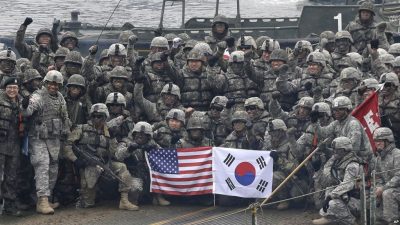Biden-Moon Summit: A New Era of Washington-Seoul Alliance?

All Global Research articles can be read in 51 languages by activating the “Translate Website” drop down menu on the top banner of our home page (Desktop version).
Visit and follow us on Instagram at @crg_globalresearch.
***
President Moon Jae-in went to Washington with the invitation of President Joe Biden. The summit took place on May 21st. After a day of discussion in a friendly and relaxed environment, the two presidents announced a joint statement which went far beyond expectation of Koreans. In fact, it points to a new and much stronger Washington-Seoul Alliance. Indeed, it could be the new charter of the bilateral alliance.
The general observation is that the summit was a success. One of the reasons of the success was, probably, President Biden’s trust in the remarkable leadership of President Moon leading to outstanding achievements of Moon’s government in its management of the pandemic, the democratization of the economy, growing technological autonomy, affirmative diplomacy and its inter-Korea and Washington-Pyongyang peace dialogue initiatives. One thing was that President Moon also seemed to have confidence in President Biden’s ambitious projects of infrastructure investments and generous social welfare program.
The agreements in the joint declaration may be summarized in this way.
First, contrary to the expectations of many observers of Washington-Seoul relations, the Biden government respects both the Trump-Kim Summit of June 12, 2018 and the inter-Korea Summit of April 17, 2018.
This means three things of paramount importance. To begin with, the U.S. and the DPRK would seek for new bilateral relations. The DPRK will undertake complete denuclearization on the Korea peninsula. In addition as far as two Koreas are concerned, the Korea war is ended and the inter-Korea economic cooperation becomes feasible,
Second, the statements have promised a new Washington-Seoul alliance of vaccine production and its global diffusion. According to this alliance, Samsung Biologics will produce Moderna vaccines. In addition, Moderna has signed a few MOUs for joint vaccine-related research projects with Korean government and research institutes. In short, Korea will become the vaccine hub in the world. This shows Biden’s confidence in Korea’s capacity of vaccine production and Moon’s vision of making vaccine as global public good. This is, in fact, vaccine diplomacy competing with Chinese vaccine diplomacy.
Third, the joint statement means also the creation of a Washington-Seoul partnership in the creation of global value chain of semiconductors and batteries needed for electric automobiles. Samsung, LG and SK will invest in the U.S. as much as 40 billion USD for the production of chips and batteries needed for electric cars. This project is a part of the process of de-coupling of the value chain presently dominated by China. This could mean in fact the beginning of the de-coupling of the China-dominated value chain of automobiles
Fourth, the joint statement deals with some issues which are sensitive in the present context of Sino-American hegemonic rivalry in the Indo-Pacific region. The document says that both parties are concerned with the Taiwan crisis without mentioning China. The document mentions also the Quad with no reference to China.
However, in the document, Korea, along with the U.S., opposes all activities that undermine, destabilize and threaten the rule-based international order in the South China Sea and beyond. This is another part of the document which might invite China’s displeasure.
In relation to the DPRK, both sides agree for the improvement of human rights problem. This is a sensitive issue for Pyongyang. On the other hand, Biden’s nomination of Kim Sung as special North Korea envoy may be good news for Kim Jong-un.
Fifth, the Missile Guidelines was amended allowing South Korea to develop missiles which can 2,000 km long enough to attain China.
In the eyes of China, the joint statements mean Seoul’s active participation in Washington’s China containment policy. Therefore, South Korea finds itself in a delicate position in which it has to find a difficult balance between “security protection” by Washington and trade interest with China.
This is, in fact, the repetition of Korea’s geopolitical dilemma. There is an old Korean saying that Korea is a shrimp squeezed between two whales. If the whales collide, the shrimp will die. Once again, Korea finds itself between two whales but, this time, not as a shrimp, but as a dolphin which is surely more intelligent and stronger than the shrimp.
Through his brilliant performance at the Summit with President Biden, President Moon might have succeeded in making Korea a super intelligent dolphin capable of preventing the whales from colliding.
If this is the case, President Moon will leave his office with the legacy of being one of the most capable diplomats in the history of Korea.
*
Note to readers: Please click the share buttons above or below. Follow us on Instagram, @crg_globalresearch. Forward this article to your email lists. Crosspost on your blog site, internet forums. etc.
Prof. Joseph H. Chung is professor of economics and co-director of the East Asia Observatory (OAE) of the Study Center of Integration and Globalization (CEIM), Quebec University in Montreal (UQAM)
He is Research Associate of the Centre for Research on Globalization (CRG).
Featured image is from VOA News

